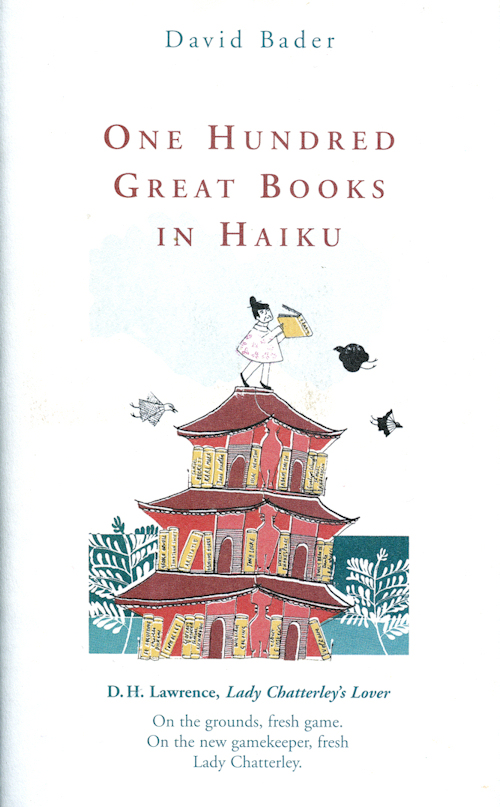David Bader
One Hundred Great Books in Haiku
Viking, 2005
I was given this little book as a Christmas stocking filler. In his Foreword the author says:
In the fifteenth century, Gutenberg … revolutionized the world of publishing. Previously, books had been so scarce that it was not uncommon for a library to have only a handful of bound Latin manuscripts, chained to a desk. Beach reading … required furniture movers. After Gutenberg, millions of books … were published … This in turn led to eyestrain, paper cuts, deforestation and adult reading groups.
In Japan, meanwhile, the seventeen-syllable haiku began to emerge. Developed by Zen monks possibly suffering from attention deficit disorder, these poems were packed with keen insights on frogs and cherry blossom yet short enough to be recited in a single breath. Japanese readers could experience and savour the finest haiku of Basho in its entirety (three lines), while Western readers of, say, John Milton’s Paradise Lost (10,000 lines) were still staring at the title page.
This collection attempts to combine these two breakthroughs … The formal requirements of haiku … have, admittedly, made it necessary to cut some things, such as characters, plot, dialogue and descriptive passages. Still, these are small sacrifices in view of the huge savings in time and shelf space.
 This is indeed what the author has done — and done rather successfully — to produce an easy read version of his selected books. Although of course one won’t necessarily agree with his entire choice of “great books” (What no Anthony Powell? No Lewis Carroll?)
This is indeed what the author has done — and done rather successfully — to produce an easy read version of his selected books. Although of course one won’t necessarily agree with his entire choice of “great books” (What no Anthony Powell? No Lewis Carroll?)
The book is easy enough reading for those last 10 minutes in bed; in fact I read the whole book in bed in about 30 minutes. But it is something one will be able to dip into once in a while for light amusement. For instance here are three entries which caught my brain …
Lady Murasaki Shikibu
Two wives, ten consorts —
under the wisteria,
many warm futons.
… … …
FINNEGANS WAKE
James Joyce
Riverrun on and
by Jaisus s’dense! Bien alors,
scribbledehobble.
… … …
METAPHYSICS
Aristotle
Substance has essence.
Form adds whatness to thatness.
Whatsits have thinghood.
There’s no real arguing with any of that!
So yes, this book is a quick read, but an amusing one, and a well worthwhile stocking filler.
Overall Rating: ★★★★☆
